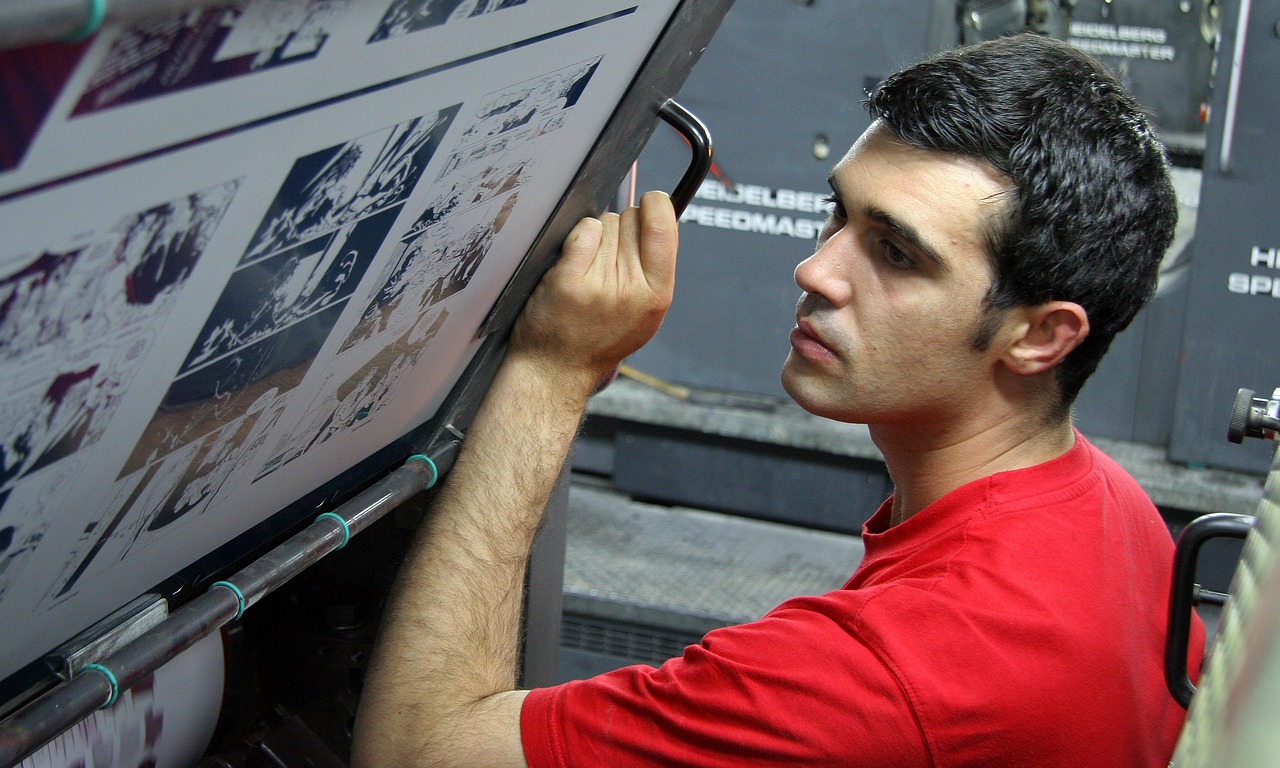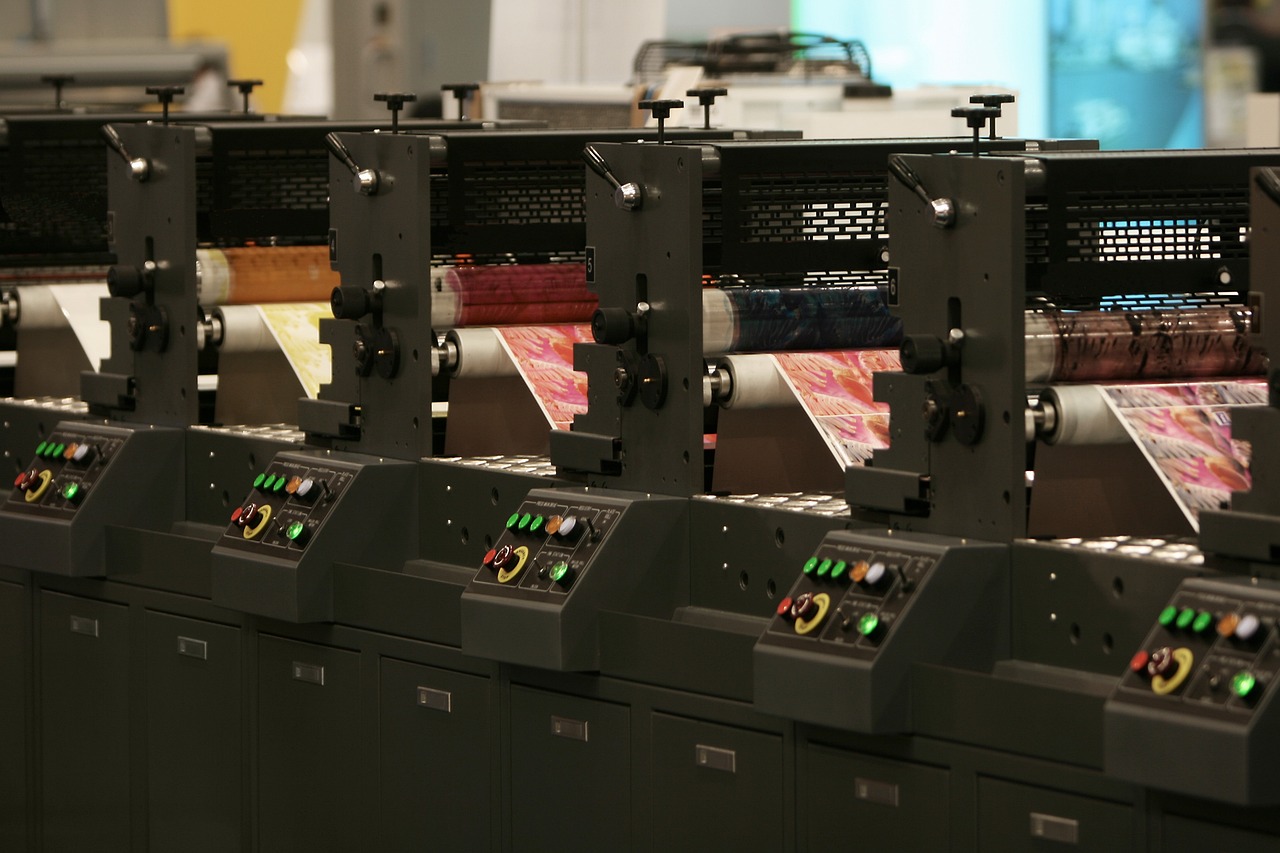The Impact of the Printing Press on Society
The printing press revolutionized communication, education, and the spread of ideas. This article explores how this invention transformed society, shaping culture, politics, and knowledge dissemination.
When Johannes Gutenberg introduced the printing press to the world in the 15th century, little did he know the explosive impact it would have on society. The ability to mass-produce books, newspapers, and pamphlets transformed the way information was shared, sparking a chain reaction of cultural, economic, and political changes.
The historical context surrounding the printing press is crucial in understanding its significance. In an era marked by technological advancements and societal shifts, this invention stood out as a beacon of progress, democratizing access to knowledge and reshaping the fabric of society.
With the advent of the printing press, information became more accessible than ever before. Books that were once rare and expensive became widely available, fueling a surge in literacy rates and intellectual discourse. The dissemination of ideas through printed materials had a ripple effect, influencing public opinion and shaping the collective consciousness.
The economic impact of the printing press cannot be overstated. As the demand for printed materials soared, a burgeoning publishing industry emerged, creating jobs and stimulating economic growth. The ability to produce texts on a large scale not only democratized education but also laid the groundwork for future innovations in communication.
Culturally, the printing press ushered in a new era of enlightenment. By preserving and disseminating historical texts, it became a custodian of knowledge, ensuring that wisdom from the past was not lost to time. The proliferation of literature and scientific discoveries sparked a renaissance of ideas, fostering creativity and innovation.
Politically, the printing press empowered individuals to challenge authority and advocate for change. Printed materials became a tool for dissent, fueling social movements and revolutions. The ability to express opinions freely paved the way for democratic ideals to take root, reshaping the political landscape forever.
Religiously, the printing press played a pivotal role in the Protestant Reformation. Martin Luther's 95 Theses, printed and distributed widely, sparked a religious revolution that forever altered the course of Christianity. The ability to disseminate religious texts in the vernacular language empowered believers and led to a diversification of religious practices.
The global impact of the printing press transcended borders, bridging cultures and languages. It facilitated cross-cultural exchanges, standardizing languages, and accelerating the globalization of knowledge. The world became more interconnected than ever before, laying the foundation for a truly global society.
The legacy of the printing press endures to this day, shaping the evolution of modern communication technologies. From the rise of digital publishing to the proliferation of online information, the spirit of innovation sparked by Gutenberg's invention lives on. As we look to the future, the lessons of the printing press remind us of the power of ideas and the transformative impact of communication on society.

Historical Context
The printing press revolutionized communication, education, and the spread of ideas. This article explores how this invention transformed society, shaping culture, politics, and knowledge dissemination.
The historical context of the printing press is crucial in understanding its monumental impact on society. In the mid-15th century, Johannes Gutenberg's invention of the movable type printing press in Europe marked a turning point in history. Prior to this innovation, books were painstakingly copied by hand, limiting their availability and accessibility. Gutenberg's press changed the game by allowing for the mass production of printed materials, significantly reducing the time and effort required to create books and other written works.
This technological breakthrough occurred during the Renaissance period, a time of intellectual and cultural rebirth in Europe. The printing press emerged in a world hungry for knowledge and eager to exchange ideas. As a result, the dissemination of information became faster, more efficient, and widespread, laying the foundation for the communication revolution that would follow.
The printing press not only accelerated the spread of knowledge but also democratized information. It shifted the power dynamics of learning from the hands of the elite few to the broader population. Suddenly, individuals from all walks of life had access to literature, scientific discoveries, and philosophical treatises that were previously reserved for the privileged few. This democratization of knowledge fueled intellectual curiosity, innovation, and critical thinking, setting the stage for societal transformation.

Dissemination of Information
The printing press revolutionized communication, education, and the spread of ideas. This article explores how this invention transformed society, shaping culture, politics, and knowledge dissemination.
The dissemination of information through the printing press marked a monumental shift in the way knowledge was shared and accessed. With the ability to mass-produce books, newspapers, and pamphlets, the printing press democratized information, allowing it to reach a broader audience than ever before. This widespread distribution of knowledge had profound effects on public opinion, intellectual discourse, and societal progress.

Economic Impact
The printing press revolutionized communication, education, and the spread of ideas. This article explores how this invention transformed society, shaping culture, politics, and knowledge dissemination.
Understanding the historical background of the printing press reveals its significance in the context of technological advancements and societal changes during its time.
The printing press enabled the mass production of books, newspapers, and pamphlets, leading to a widespread distribution of information that influenced public opinion and knowledge sharing.
The printing press played a pivotal role in the development of the publishing industry, creating new job opportunities, fostering literacy, and contributing to economic growth. The economic impact of the printing press was profound, as it not only increased the availability of printed materials but also stimulated the demand for them. This led to the growth of printing businesses, the establishment of printing houses, and the rise of a skilled workforce dedicated to the production of books and other printed materials.
Moreover, the printing press reduced the cost of producing written works, making them more affordable and accessible to a wider audience. This accessibility to information and knowledge contributed to the overall improvement of literacy rates, which in turn had a positive impact on various sectors of the economy. As more people became literate, new opportunities for education, employment, and economic advancement emerged, fueling societal progress and development.
In addition, the printing press facilitated the dissemination of commercial information, advertising, and trade-related materials, boosting commerce and trade activities. It played a crucial role in standardizing formats for documents such as contracts, invoices, and letters, streamlining business operations and enhancing communication between merchants and customers.
By making literature and knowledge more accessible, the printing press fueled cultural shifts, promoted literacy, and facilitated the preservation of historical texts.
Printed materials empowered individuals to voice dissent, challenge authority, and participate in political discourse, contributing to the rise of democratic ideals and social movements.
The printing press played a crucial role in the Protestant Reformation, allowing for the rapid dissemination of reformist ideas and religious texts that reshaped religious practices and beliefs.
The widespread adoption of the printing press transcended borders, facilitating cross-cultural exchanges, the standardization of languages, and the globalization of knowledge.
The enduring legacy of the printing press continues to influence modern communication technologies, paving the way for future innovations in information dissemination and societal progress.
Q: How did the printing press impact education?
A: The printing press revolutionized education by making books and educational materials more accessible, leading to increased literacy rates and the dissemination of knowledge on a larger scale.
Q: What role did the printing press play in the spread of ideas?
A: The printing press facilitated the rapid dissemination of ideas through the mass production of books, newspapers, and pamphlets, influencing public opinion and promoting intellectual discourse.
Q: How did the printing press contribute to the rise of democracy?
A: Printed materials allowed individuals to engage in political discussions, voice dissent, and challenge authority, fostering the growth of democratic ideals and social movements.

Cultural Transformation
The printing press revolutionized communication, education, and the spread of ideas. This article explores how this invention transformed society, shaping culture, politics, and knowledge dissemination.
Understanding the historical background of the printing press reveals its significance in the context of technological advancements and societal changes during its time.
The printing press enabled the mass production of books, newspapers, and pamphlets, leading to a widespread distribution of information that influenced public opinion and knowledge sharing.
The printing press played a pivotal role in the development of the publishing industry, creating new job opportunities, fostering literacy, and contributing to economic growth.
By making literature and knowledge more accessible, the printing press fueled cultural shifts, promoted literacy, and facilitated the preservation of historical texts. It acted as a catalyst, sparking intellectual curiosity and nurturing a society hungry for learning. The ability to reproduce texts on a large scale allowed for the preservation and dissemination of cultural heritage, ensuring that valuable knowledge was not lost to time. Just as a painter mixes colors on a palette to create a masterpiece, the printing press blended words and ideas to paint a vibrant cultural landscape.
Printed materials empowered individuals to voice dissent, challenge authority, and participate in political discourse, contributing to the rise of democratic ideals and social movements.
The printing press played a crucial role in the Protestant Reformation, allowing for the rapid dissemination of reformist ideas and religious texts that reshaped religious practices and beliefs.
The widespread adoption of the printing press transcended borders, facilitating cross-cultural exchanges, the standardization of languages, and the globalization of knowledge.
The enduring legacy of the printing press continues to influence modern communication technologies, paving the way for future innovations in information dissemination and societal progress.
1. How did the printing press impact literacy rates in society?
The printing press significantly increased literacy rates by making books more affordable and accessible to the general population, leading to a more educated society.
2. What role did the printing press play in shaping cultural identities?
The printing press played a vital role in shaping cultural identities by preserving and disseminating cultural heritage, fostering intellectual growth, and promoting the exchange of ideas across different societies.
3. How did the printing press contribute to the rise of democratic ideals?
The printing press empowered individuals to engage in political discourse, voice dissent, and challenge authority, laying the foundation for the emergence of democratic principles and social movements.

Political Influence
The printing press revolutionized communication, education, and the spread of ideas. This article explores how this invention transformed society, shaping culture, politics, and knowledge dissemination.
The advent of the printing press ushered in a new era of political influence, empowering individuals to engage in public discourse and challenge traditional authority structures. Through printed materials such as pamphlets, manifestos, and newspapers, people found a voice to express dissent, advocate for change, and participate in shaping the political landscape.
Printed materials became powerful tools for political movements, allowing ideas to circulate widely and mobilize communities towards common goals. The ability to mass-produce political literature enabled individuals to organize, strategize, and advocate for social reform, leading to the emergence of democratic ideals and the promotion of civil liberties.
Moreover, the printing press played a crucial role in the dissemination of political theories and philosophical treatises that laid the groundwork for modern governance systems. Influential thinkers like John Locke, Thomas Paine, and Voltaire used the printed word to challenge oppressive regimes, advocate for individual rights, and promote the principles of democracy.
Political pamphlets and newspapers served as catalysts for social change, sparking revolutions, reform movements, and the establishment of new political structures. The free flow of information facilitated by the printing press fueled debates, inspired activism, and ultimately contributed to the evolution of political thought and practice.
In essence, the printing press not only democratized access to information but also democratized political participation, empowering individuals to engage in civic life, hold governments accountable, and shape the course of history through the dissemination of ideas and ideologies.
1. How did the printing press impact literacy rates in society?
2. What role did printed materials play in shaping political revolutions?
3. How did the printing press influence the development of modern governance systems?
4. What are some examples of political movements that were fueled by printed propaganda?
5. How did the printing press contribute to the spread of democratic ideals and civil liberties?

Religious Reformation
The was a pivotal period in history greatly influenced by the invention of the printing press. This technological marvel allowed for the rapid dissemination of reformist ideas and religious texts, challenging the authority of the Catholic Church and reshaping religious practices and beliefs. The ability to produce Bibles and religious tracts in large quantities enabled reformers like Martin Luther to spread their messages far and wide, sparking a movement that led to the establishment of Protestantism.
With the printing press, reformers could bypass traditional channels of communication controlled by the Church, reaching a broader audience and igniting debates on theological matters. This democratization of information played a crucial role in breaking the monopoly of religious authority, empowering individuals to interpret scripture for themselves and fostering diverse religious perspectives.
Moreover, the printing press facilitated the translation of sacred texts into vernacular languages, making religious knowledge more accessible to the general population. This linguistic diversity not only promoted literacy but also fostered cultural identities based on local languages, further fueling the spread of Protestant ideas across different regions.
The impact of the printing press on the Religious Reformation reverberated throughout Europe, triggering social and political upheavals as people questioned traditional religious practices and sought spiritual autonomy. By enabling the mass production of religious literature, the printing press accelerated the pace of religious change, leading to the fragmentation of Christianity and the emergence of new religious denominations.

Global Impact
The printing press revolutionized communication, education, and the spread of ideas. This article explores how this invention transformed society, shaping culture, politics, and knowledge dissemination.
The global impact of the printing press was profound, transcending borders and reshaping the way information was shared across different cultures and languages. With the advent of the printing press, knowledge could now be disseminated on a scale never seen before, leading to a more interconnected world.
The standardization of languages was greatly facilitated by the printing press, as texts could now be reproduced in multiple languages with greater ease. This helped bridge communication gaps between diverse communities and fostered cross-cultural exchanges that enriched societies worldwide.
Furthermore, the globalization of knowledge accelerated with the widespread adoption of the printing press. Ideas, scientific discoveries, and philosophical thoughts could now travel across continents, sparking intellectual debates and advancements that propelled human progress forward.
In essence, the printing press acted as a catalyst for cultural exchange and mutual understanding, laying the groundwork for the interconnected global society we live in today. Its impact continues to resonate in the digital age, where information flows seamlessly across borders, shaping our collective knowledge and experiences.
1. How did the printing press impact literacy rates?
2. What role did the printing press play in the Protestant Reformation?
3. How did the printing press contribute to the rise of democratic ideals?
4. What are some modern innovations inspired by the printing press?

Legacy and Future Innovations
The legacy of the printing press is deeply rooted in the fabric of society, leaving an indelible mark on how information is shared and disseminated. Its impact extends far beyond its invention, shaping the course of history and laying the foundation for future innovations in communication technology.
One of the key legacies of the printing press is its role in democratizing knowledge. By making books and other printed materials more accessible to the masses, it empowered individuals to educate themselves and engage with a wide range of ideas. This democratization of information paved the way for the Enlightenment and the spread of new scientific discoveries.
Furthermore, the printing press revolutionized the way we communicate, setting the stage for the development of modern mass media. The ability to reproduce written content quickly and efficiently laid the groundwork for newspapers, magazines, and eventually digital media platforms that shape our understanding of the world today.
In terms of future innovations, the legacy of the printing press continues to inspire advancements in information dissemination. From the invention of the internet to the rise of social media, each new technology builds upon the foundation laid by Gutenberg's revolutionary machine. The principles of mass production and widespread distribution established by the printing press still resonate in the digital age.
Looking ahead, the future of communication technology holds endless possibilities, driven by the same spirit of innovation that fueled the printing press. As we navigate an increasingly interconnected world, the lessons of the past continue to guide us towards new frontiers in knowledge sharing and societal progress.
Frequently Asked Questions
- What impact did the printing press have on society?
The printing press had a profound impact on society by revolutionizing communication, education, and the spread of ideas. It transformed the way information was shared, shaping culture, politics, and knowledge dissemination.
- How did the printing press influence the dissemination of information?
The printing press enabled the mass production of books, newspapers, and pamphlets, leading to a widespread distribution of information. This facilitated the sharing of knowledge, influenced public opinion, and played a significant role in the cultural and intellectual development of society.
- What was the economic impact of the printing press?
The printing press played a pivotal role in the development of the publishing industry, creating new job opportunities, fostering literacy, and contributing to economic growth. It revolutionized the way information was produced and consumed, leading to significant economic benefits.
- How did the printing press contribute to cultural transformation?
By making literature and knowledge more accessible, the printing press fueled cultural shifts, promoted literacy, and facilitated the preservation of historical texts. It played a crucial role in shaping cultural identity and promoting intellectual development.
- What political influence did the printing press have?
Printed materials empowered individuals to voice dissent, challenge authority, and participate in political discourse. This contributed to the rise of democratic ideals, social movements, and the spread of revolutionary ideas that shaped the course of history.
- How did the printing press impact religious reformation?
The printing press played a crucial role in the Protestant Reformation by allowing for the rapid dissemination of reformist ideas and religious texts. It reshaped religious practices and beliefs, leading to significant changes in the religious landscape of the time.
- What was the global impact of the printing press?
The widespread adoption of the printing press transcended borders, facilitating cross-cultural exchanges, the standardization of languages, and the globalization of knowledge. It played a key role in connecting diverse societies and promoting the exchange of ideas on a global scale.
- What is the legacy of the printing press and its future innovations?
The enduring legacy of the printing press continues to influence modern communication technologies, paving the way for future innovations in information dissemination and societal progress. It laid the foundation for the development of new media forms and communication methods that continue to shape our world today.


















